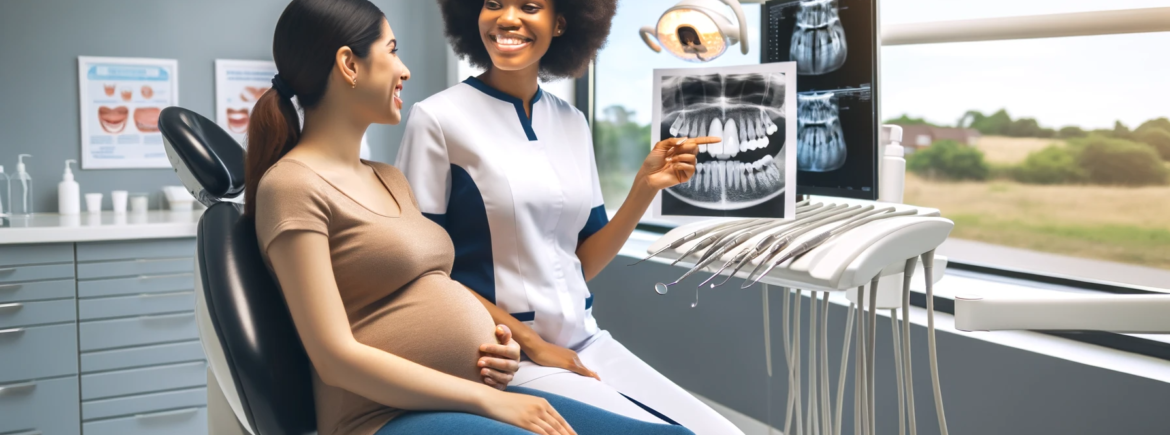Pregnancy and Oral Health
Navigating through pregnancy comes with its share of joys and challenges, with oral health being a pivotal aspect that often demands attention. At our Dental Clinic in Perth, we underscore the importance of dental wellness during this significant phase of life. Hormonal surges can lead to dental issues like gingivitis and tooth erosion, which, if unchecked, may escalate. Our article elucidates the intertwining paths of pregnancy and dental health, offering a guide to managing these challenges effectively.

Dental Health and Pregnant Women
Pregnancy is a time of excitement and change, not just for the body but also for oral health. The surge in pregnancy hormones can lead to increased sensitivity of the gums and a higher susceptibility to dental problems. Consequently, the need for dental treatment during this period may arise.
Specifically, these hormones may make women more prone to conditions like the early stage of gum disease due to an enhanced reaction to dental plaque. Moreover, cravings for sugary foods and snacks can further exacerbate risks for tooth decay. Acidic foods can also cause dental erosion. The Australian Dental Association stresses the importance of good oral and dental health during these months, both for the mother’s well-being and the baby’s health.
Stay informed, and ensure regular check-ups to safeguard your health and that of your child.
How Can Hormonal Changes During Pregnancy Affect Teeth and Gums?
During pregnancy, there’s a significant shift in pregnancy hormones. This hormonal tide directly affects oral health, leading to various challenges for women.
First, the gum sensitivity experienced by many results from these hormonal changes. Increased progesterone and estrogen levels affect the body’s response to dental plaque, causing gums to become more reactive and inflamed. If not addressed, this sensitivity can pave the way for conditions like pregnancy gingivitis.
Additionally, the hormones can also cause increased blood flow to the gums, making them more susceptible to bleeding and inflammation. While some of these symptoms may seem alarming, understanding their connection to pregnancy can help address them more effectively.
Common Dental Problems During Pregnancy
Pregnancy, a transformative period for many women, often brings along several dental problems due to hormonal changes. Recognising and addressing these dental health problems early can influence pregnancy outcomes positively.
Gingivitis
This inflammation of the gums is prevalent among women who are pregnant. The main culprit? Increased pregnancy hormones can make gums more sensitive to plaque, causing swelling and bleeding.
If gingivitis remains untreated, it could escalate into more severe gum disease or periodontal disease.
Pregnancy Epulis (pregnancy tumours)
Though it sounds concerning, a pregnancy tumour is a benign growth on the gums. The increased blood flow and pregnancy hormones often contribute to this. It usually recedes post-pregnancy but might require treatment if it causes discomfort.
Tooth Erosion
Morning sickness is a common symptom during pregnancy, with stomach acids coming into contact with teeth. This frequent exposure to acid can damage tooth enamel and lead to dental erosion.
Periodontitis
Periodontitis is a severe gum disease and is one of the most concerning periodontal diseases. When left untreated, it has potential links to preterm birth (premature birth) and preterm low-birth-weight babies. The increased risk is due to the bacteria from the gums entering the bloodstream, potentially affecting the unborn child. Loose teeth and tooth loss are other complications often associated with untreated periodontitis.
Recognising and addressing these dental health problems, such as gum problems and treating periodontal disease early can be beneficial for both the mother’s and baby’s health. Keeping the gums healthy through regular dental check-ups with your South Perth Dentist and proper oral health care practices is essential during this period.
Importance of Oral Hygiene During Pregnancy
Oral health care becomes even more crucial during pregnancy due to the increased risk of dental problems. Proper dental care ensures the mother’s health and plays a pivotal role in the baby’s well-being.
Brushing and Flossing: Regular brushing and flossing effectively remove dental plaque, which can exacerbate due to hormonal changes. Using fluoride toothpaste can help combat potential dental decay.
Dental Check-Ups: Pregnant women should not skip their routine dental check-ups. It provides an opportunity for professionals to spot and tackle issues early on. During these visits, make sure to inform the dentist about your pregnancy. Some dental treatments might be postponed, while others are deemed safe.
Dietary Choices: The foods you consume can directly affect oral health. For instance, frequent consumption of sugary snacks and acidic foods can lead to dental erosion and cavities. On the flip side, a balanced diet promotes healthier gums and teeth.
Safe Dental Procedures: While most routine dental treatments are safe, some, like x-rays, teeth whitening, or having a tooth pulled, might be delayed until after the baby’s birth. It’s always best to discuss the safety of each procedure with your dentist.
Morning Sickness and Oral Health: If morning sickness is a regular occurrence, avoid brushing your teeth immediately after vomiting to prevent tooth erosion from stomach acids. Instead, rinse your mouth with water or a fluoride mouthwash.
Incorporating these dental care tips can significantly reduce the chances of facing severe dental health problems during pregnancy. Your oral health is integral to your overall health, especially during this vital period. Always prioritise it.

Diet and Oral Health During Pregnancy
What you eat during pregnancy affects not just your general health but also your oral and dental health. Here’s a breakdown:
Balanced Diet
A balanced diet ensures the health of both mother and baby. Nutrients like calcium, vitamin D, and phosphorus play a vital role in the development of the baby’s teeth and bones. While these nutrients support strong teeth and bone structure, proper oral hygiene and reduced sugar intake are crucial for preventing tooth decay and maintaining healthy gums.
Foods That Promote Good Oral Health
Dairy products, leafy greens, and fortified foods can help combat potential dental health problems. Chewing sugar-free gum can also stimulate saliva flow, neutralising the harmful acids that can cause cavities.
Foods to Be Cautious Of
Regular intake of sugary snacks and beverages increases the risk of tooth decay and gum disease. Regular intake of sugary snacks can not only harm the mother’s dental health but can also set the stage for early childhood caries in the baby later on. Acidic foods can lead to dental erosion, especially if consumed frequently.
Dealing with Cravings
Pregnancy often brings about intense food cravings. If you frequently crave sweets, try to opt for low-sugar foods and ensure you maintain good oral hygiene practices afterwards.
Stay Hydrated
Drinking plenty of water helps wash away food particles and bacteria, reducing the risk of dental problems. Pregnancy is a time of numerous dietary changes and challenges. By being mindful of your eating habits and their impact on your dental health, you can ensure a smoother journey for yourself and your baby.
Tips for Maintaining Oral Health During Pregnancy
Ensuring good oral health during pregnancy is essential not just for your own well-being but also for the baby’s health. Here are some key practices to consider:
Inform Your Dentist: Whenever you visit the dental chair, ensure you inform your Perth dentist about your pregnancy. This knowledge will guide them in recommending safe dental treatments and procedures tailored for pregnant women.
Choose Products Wisely: Opt for fluoride toothpaste and a soft-bristled toothbrush. If morning sickness makes brushing challenging, try using a toothpaste with a mild flavour.
Address Morning Sickness: To minimise the effects of morning sickness on enamel, avoid brushing your teeth immediately after vomiting. Instead, rinse with water or a fluoride mouthwash to neutralise acids.
The Role of Fluoride: Using fluoride toothpaste helps strengthen the tooth enamel, reducing the chances of tooth erosion and developing tooth decay. Check with your dentist if supplemental fluoride is necessary for your situation.
Maintain Regular Dental Routines: Regular brushing, using dental floss, and rinsing with an antimicrobial mouthwash can keep gum problems at bay and ensure healthy gums.
Dietary Habits: As discussed earlier, limiting sugary snacks and acidic foods is best. Embrace a diet rich in calcium, vitamin C, and B12 to support oral health.
Stay Updated with Check-ups: Do not neglect regular dental checkups. These visits can help in early detection and treatment of dental health problems, ensuring both you and your baby remain healthy.
Pregnancy brings changes, but with the right dental care practices, you can navigate this period with a confident and healthy smile.
Frequently Asked Questions about Oral Health During Pregnancy
Can I have a dental x-ray while pregnant? It is a question many expectant mothers ask. Although dental X-rays involve minimal radiation exposure and are generally considered safe, informing your dentist about your pregnancy and its stage is crucial, especially if you’re in the first trimester. Given this information, your dentist may choose to delay non-urgent X-rays until after your baby is born or take additional precautions to ensure your safety.
Is it safe to have dental treatment like fillings or extractions during pregnancy? In general, most routine dental procedures are considered safe during pregnancy. The second trimester is typically the preferred and most comfortable period for dental care. It’s imperative to keep an open line of communication with your dentist regarding any treatments, ensuring the safety of both you and your baby.
I’m experiencing bleeding gums during pregnancy. Should I be concerned? Bleeding gums, sometimes called pregnancy gingivitis, can result from increased hormones during pregnancy. While this is a common occurrence, maintaining good oral hygiene is crucial. It’s also wise to consult with your dentist to ensure there aren’t any other underlying issues and to prevent potential complications.
How can I deal with morning sickness without damaging my teeth? Morning sickness can be challenging. Avoid brushing your teeth immediately after vomiting to prevent tooth erosion from stomach acids. Rinse with water or a mild baking soda solution to neutralise the acids.
Do I need to change my toothpaste when I’m pregnant? It’s not typically necessary. However, due to morning sickness, some flavours might become intolerable. In such cases, consider switching to a toothpaste with a milder flavour. Always choose a toothpaste that contains fluoride to help protect against decay.
Is it safe to use teeth-whitening products during pregnancy? Current research on the effects of teeth whitening during pregnancy is limited. As a result, many dentists and health professionals advise against using teeth-whitening treatments during this time. It’s recommended to delay any cosmetic dental procedures until after pregnancy and breastfeeding to be on the safe side.
How does pregnancy affect previous dental restorations like fillings or crowns? Pregnancy in itself doesn’t typically affect the stability or integrity of previous dental restorations. However, hormonal changes during pregnancy may increase gum sensitivity and swelling. It might make the areas around crowns or fillings feel different. If you experience any discomfort around your restorations, it’s essential to consult your dentist. It’s important to note that any feelings of “looseness” or discomfort related to dental restorations should be addressed by a dentist, regardless of whether one is pregnant.
Can pregnancy lead to tooth loss or loosening? While the old saying ‘lose a tooth for every child’ is a myth, the hormonal changes during pregnancy can influence the tissues and bones that support your teeth. It may cause teeth to feel slightly looser, but it doesn’t typically lead to tooth loss. Maintaining good oral hygiene and regular dental check-ups during pregnancy are essential to address potential concerns. Always consult a dentist if there are concerns about tooth mobility or any other dental issues during pregnancy.
Are there any special mouthwashes recommended for pregnant women? Many over-the-counter mouthwashes are suitable for pregnant women. However, it’s advisable to opt for alcohol-free versions, as they are generally milder. If you’re experiencing gum issues during pregnancy, there are mouthwashes designed to support gum health. Always consult your dentist or doctor to ensure a specific product is appropriate during pregnancy. Remember, while mouthwash can be a beneficial addition to an oral care routine, it should not replace regular brushing and flossing.
Can dental problems during pregnancy cause complications in childbirth? Research has indicated a potential association between periodontitis and adverse pregnancy outcomes, such as premature birth or low birth weight babies. Although the exact causal link has not been conclusively established, it’s essential to maintain good oral health during pregnancy for the overall well-being of both the mother and the baby. In light of these findings, it’s prudent for pregnant women to maintain regular dental check-ups and adhere to recommended oral hygiene practices. If periodontal disease is detected, timely treatment can potentially reduce associated risks.
How soon after childbirth can I resume regular dental procedures? After childbirth, you can generally resume regular dental procedures without much delay. However, if you are breastfeeding, informing your dentist is important. They can ensure that any medications or treatments are safe for you and your baby.
What should I do if I have a dental emergency while pregnant? If you experience a dental emergency while pregnant, don’t delay in seeking care. Contact your dentist immediately. Most dental emergencies can and should be addressed during pregnancy, particularly if there’s a risk of infection or severe pain. It’s crucial to communicate your pregnancy status to your dentist so they can take necessary precautions and provide the safest care possible for both you and your baby. Remember, it’s always best to err on the side of caution and consult with your dentist and obstetrician when facing dental issues during pregnancy.
Can dental medications or local anaesthetics used during treatments affect my baby? Most local anaesthetics, like lidocaine, are considered safe for pregnant women in controlled amounts. Always inform your dentist about your pregnancy so they can choose the safest options and dosages.
How does prenatal vitamin intake impact oral health? Prenatal vitamins are designed to support both the mother’s and baby’s health. Nutrients like calcium, vitamin D, and phosphorus can benefit oral health by strengthening teeth and supporting bone health. Moreover, folic acid, often present in prenatal vitamins, may help reduce the risk of some birth defects and can also play a role in gum health.
Paediatric Dentistry
As we wrap up our discussion on the importance of dental health for expectant mothers, it’s also crucial to look ahead. The role of pediatric dentistry in early childhood cannot be overstated. Choosing a skilled pediatric dentist ensures that your child’s oral health is on the right track from the beginning. Pediatric dentistry, with its focus on preventive care and education, is essential for establishing a lifetime of healthy dental habits.

Schedule Your Pregnancy Dental Check-up at Acts Dental!
Prioritise your oral health and the well-being of your baby. Located in the heart of Perth, Acts Dental is committed to providing exceptional care for expecting mothers. We take pride in being a Bupa-preferred provider, Nib-preferred provider, Medibank-preferred provider, HCF-preferred provider, and HBF-preferred provider dentist in Perth.
Book your appointment today and experience dental services tailored to your unique needs during this special time. Schedule your consultation now by calling us at (08) 9474 5083; you can book your appointment online.


